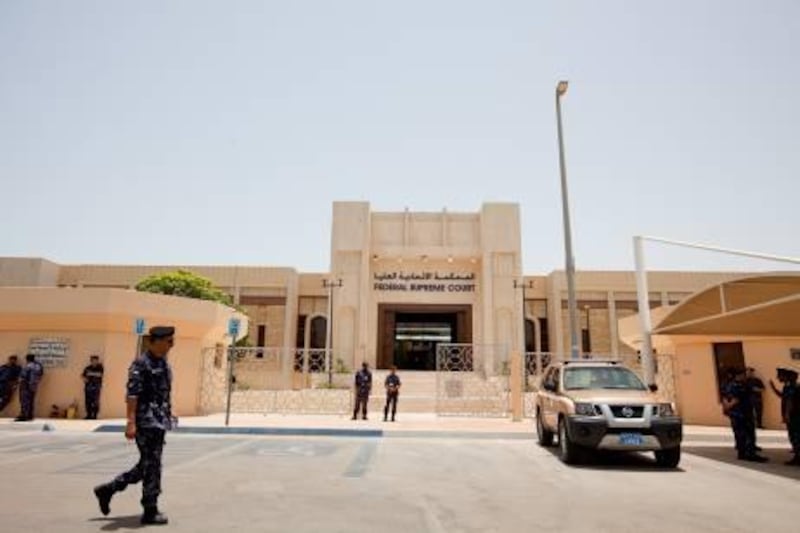ABU DHABI // After four months, 13 sessions and thousands of pages of files and evidence, the 94 accused and their families would know their fate imminently. Across the nation, virtually everyone was discussing one thing: the verdict in the trial.
Family members were escorted in and allowed to take their seats. This time, walking into the State Security Court was different from previous hearings: the atmosphere was tense and security was high. You could almost cut through the air of anticipation, nervousness and hope as people repeatedly glanced at the clock on the wall, waiting for the judge to arrive.
There were considerably more bailiffs than before, both female and male, to keep the local media away from family members and defendants. Every move, every sigh, every wave was noted, as the bailiffs worked to ensure order.
The defendants looked almost joyful, smiling at each other and their relatives, waving and giving each other a thumbs-up. Each family member appeared to stop and scan the group of accused for their relative, and smiles, waves and sometimes kisses would follow. The court was filled with chatter, sometimes laughter.
The room was entirely filled, save for a few seats in the female family members' area. The crowd had raised the temperature in the cavernous courtroom to hot and stuffy when it used to be chilly - a source of numerous complaints before.
A video camera, the sole electronic device allowed, sat in the middle of the courtroom facing the judge's bench.
Many defendants had hoped they would be acquitted, and one held up two pieces of paper with "We love you people of the UAE" painted in the colours of the flag - red, green, and black - and the other read "Our Ramadan will be with you". He joked it was their "pieces of art" and praised a fellow accused who had taken the time to draw them.
Another said loudly: "God willing, we will be acquitted," and many family members repeated it after him. Another defendant turned to members of the media, first thanking them for the coverage, then beseeching them to "listen to both sides".
"You did not speak to our wives and families, listen to us and to our families," he pleaded, when court bailiffs asked him to keep quiet and remain seated. Another shouted to let him speak.
Shortly before the judge entered the chamber, some of the female family members began sobbing, as those near them sought to calm them. Male relatives looked down or closed their eyes, and sought to convey confidence, reciting the Quran quietly.
Then the judge walked in and the entire room stood in unison. He sat down and let out a big sigh, followed by another before preparing his papers to read the verdicts. The cameraman immediately put on his headphones and got into position to record one of the crucial moments in the UAE's history.
The room went dead silent. Judge Al Hajeri remained calm, but the gravity of the situation was visible in his face. His voice crackled, then he cleared his throat and began reading in a slow deliberate voice, his tenor rising as he spoke.
He declared 25 accused not guilty, and the room remained silent. He sentenced eight to 15 years in their absence, and there were rustles in the room. Then he methodically read the names of each of the remaining defendants found guilty, to a growing commotion.
As soon as he had sentenced the 56 to 10 years in prison, a female relative shrieked for God's mercy, and a choir of other women's voices followed. She was escorted out by several female police officers, and the cries and wails grew as Judge Al Hajeri continued reading the judgment.
When he finished, he stood abruptly and left the courtroom, his papers in hand, and the media were swiftly escorted out of a side door with bailiffs at their sides.
Out of the rumble in the room, we could hear wails and chant of "Allahu Akbar", and prayers.






